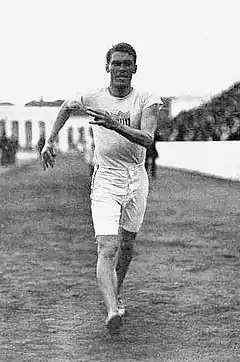George Bonhag
George Valentine Bonhag (January 31, 1882 – October 30, 1960) was an American athlete and a member of the Irish American Athletic Club and the New York City Police Department. He competed in distance events, both racewalking and running, at the 1904, 1908 and 1912 Olympics and at the 1906 Intercalated Games.[3]
 Bonhag winning the 1500 m walk at the 1906 Intercalated Games | |
| Personal information | |
|---|---|
| Born | January 31, 1882 Boston, United States |
| Died | October 30, 1960 (aged 78) Bronx, New York City, U.S. |
| Height | 179 cm (5 ft 10 in) |
| Weight | 60 kg (132 lb) |
| Sport | |
| Sport | Athletics |
| Event(s) | 1-6 miles |
| Club | I-AAC, Queens |
| Achievements and titles | |
| Personal best(s) | Mile – 4:22.4i (1910) 2 miles – 9:20.8i (1911) 5000 m – 15:05.8i (1912) 6 miles – 30:42.0i (1909)[1][2] |
Medal record
| |
An announcement in the August 6, 1904 issue of The New York Times indicated that the Metropolitan Association of the Amateur Athletic Union would hold a "special five-mile race" at Celtic Park on August 13, 1904 with the eight top finishers receiving a paid trip to compete in the marathon at the Olympic Games in St. Louis on August 30, 1904.[4] Bonhag, listed as representing the Greater New York Irish Athletic Association, was named as one of 19 "probable competitors" in the event.[4]
At the 1904 Summer Olympics he competed in 800 m running but his result is unknown. At the 1906 Intercalated Games he placed fourth over 5 miles and sixth over 1500 m. Disappointed and highly motivated to make up for his loss he entered the 1500 m walk and won the gold medal. This was the only time he competed in this event, and the first walking race at Olympics. The rules were not clearly set, and many of the nine competitors, including Bonhag, were "skipping" (i.e. changing to half-running). The first two finishers, Robert Wilkinson and Eugen Spiegler were disqualified for skipping. Two of four judges voted to disqualify Bonhag too, but he was defended by James Sullivan, chief judge of the event, and Prince George, who was president of the jury. A re-walk was set up between Bonhag and Don Linden, who finished fourth. Bonhag did not show up at the re-walk, and for uncertain reasons the jury did not change the race results and gave the gold medal to Bonhag and silver to Linden.[5]
Two years later Bonhag was part of the American 3 mile team that won the silver medal. Bonhag also participated in the 3200 m steeplechase event, but was eliminated in the first round. In his fourth Olympics in 1912 he won a team gold medal in the 3000 m race and placed fourth over 5000 m. He also participated in the individual cross country contest. As he was one of three Americans who did not finish the race, his team was unplaced.[1]
Bonhag also competed in the exhibition baseball tournament at the 1912 Olympics.[1]
References
| Wikimedia Commons has media related to George Bonhag. |
- George Bonhag Archived December 29, 2008, at the Wayback Machine. sports-reference.com
- George Bonhag. trackfield.brinkster.net
- "George Bonhag". Olympedia. Retrieved January 17, 2021.
- "Will Run for St. Louis Trip – Eight Best Men in Race to Go to World's Fair for Big Event". The New York Times. August 6, 1904. p. 3. Retrieved September 3, 2017.
- Athletics at the 1906 Athina Summer Games: Men's 1,500 metres Walk Archived March 4, 2016, at the Wayback Machine. sports-reference.com
Further reading
- Cook, Theodore Andrea (May 1909). The Fourth Olympiad London 1908 Official Report (PDF). London: British Olympic Association. Retrieved 2008-12-29.
- De Wael, Herman (2001). "Athletics 1908". Herman's Full Olympians.
- Greenberg, Stan (1989). Olympic Games: The Records. London: Guinness Books. ISBN 0-85112-896-3.
External links
| Olympic Games | ||
|---|---|---|
| Preceded by Ralph Rose |
Flagbearer for Stockholm 1912 |
Succeeded by Pat McDonald |